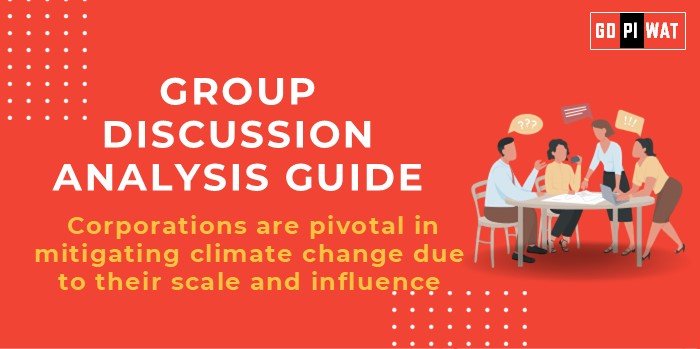🌍 Group Discussion (GD) Analysis Guide
📋 Introduction to the Topic
Context Setting:
Corporations significantly influence environmental outcomes, contributing to over 70% of global greenhouse gas emissions. Their role in addressing climate change is pivotal for achieving sustainable development.
Topic Background:
The Paris Agreement, the UN’s Sustainable Development Goals (SDGs), and growing investor emphasis on Environmental, Social, and Governance (ESG) metrics underscore the urgency for corporations to act. Recent legal cases and shareholder activism reflect society’s growing demand for corporate accountability in climate action.
📊 Quick Facts and Key Statistics
- 🌍 Corporate Emissions: Top 100 companies contribute 71% of global greenhouse gas emissions.
- 💰 ESG Investments: Over $35 trillion globally are allocated to ESG-aligned portfolios (2023).
- 🌱 Net-Zero Pledges: As of 2024, 25% of Fortune 500 companies have pledged net-zero emissions by 2050.
- ⚠️ Cost of Inaction: Climate change could reduce global GDP by 11-14% by 2050 (World Bank, 2023).
👥 Stakeholders and Their Roles
- Corporations: Implement emission-reduction strategies and green innovations.
- Governments: Enforce regulations and incentivize sustainable practices.
- Investors: Promote ESG adherence through investment choices.
- Consumers: Drive change via sustainable purchasing decisions.
- NGOs and Activists: Monitor and advocate for corporate accountability.
🏆 Achievements and Challenges
Achievements:
- 🌟 Green Innovations: Tesla revolutionized the EV market, reducing dependence on fossil fuels.
- ⚡ Renewable Commitments: Google achieved 100% renewable energy usage in its operations (2023).
- ♻️ Circular Economy Models: Companies like IKEA have implemented take-back and recycling programs.
Challenges:
- ❌ Greenwashing: Many corporations overstate sustainability claims without tangible impact.
- ⚖️ Policy Gaps: Weak enforcement of climate-related regulations in several regions.
- 💸 High Costs: Transitioning to green technologies remains prohibitively expensive for small businesses.
Global Comparisons:
- ✅ Success: Denmark’s Ørsted transitioned from fossil fuels to renewable energy entirely.
- ❌ Failure: The U.S. withdrawal from the Paris Agreement under Trump delayed corporate commitments.
📚 Structured Arguments for Discussion
- ✅ Supporting Stance: “Corporations, as major contributors to emissions, have the resources and moral obligation to lead climate mitigation efforts.”
- ❌ Opposing Stance: “Governments, not corporations, should bear primary responsibility for climate regulations.”
- ⚖️ Balanced Perspective: “Both corporations and governments must collaborate, with the former integrating sustainability into their business models.”
💡 Effective Discussion Approaches
Opening Approaches:
- 📊 “Global corporations contribute to over 70% of emissions. How they choose to act shapes our climate future.”
- 📣 “Shareholder activism is compelling firms like ExxonMobil to prioritize sustainability.”
Counter-Argument Handling:
- Highlight successful corporate efforts.
- Emphasize collaborative frameworks like public-private partnerships.
🔍 Strategic Analysis of Strengths and Weaknesses
- Strengths: Access to resources, ability to innovate.
- Weaknesses: Greenwashing, high costs.
- Opportunities: Green technology adoption, reputation building.
- Threats: Policy penalties, shareholder lawsuits.
📈 Connecting with B-School Applications
Real-World Applications:
- Case studies in green financing.
- Impact assessment for supply chain emissions.
Sample Questions:
- 🧐 “Should corporations prioritize profits over environmental responsibilities?”
- 🔍 “How can ESG compliance create competitive advantages?”
Insights for Students:
- Sustainability metrics are integral to finance, marketing, and operations.
- Leverage examples to frame policy or CSR discussions.


